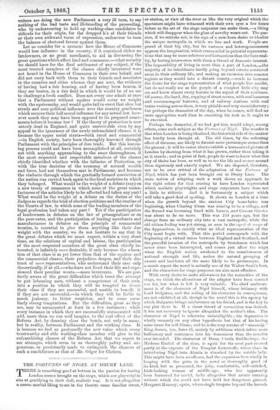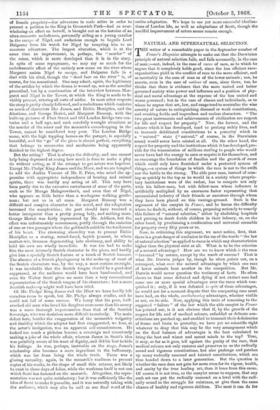THE FORTUNES OF NIGEL AT DRURY LANE. T HERE is something
good at bottom in the passion for having London scenes brought on the stage, which our playwrights aim at gratifying in their dull, realistic way. It is not altogether a coarse morbid liking to see in the theatre some familiar street, or station, or view of the river as like the very original which the spectators might have witnessed with their own eyes a few hours before as the art of the stage carpenter can make them,—a liking which will disappear when the gloss of novelty wears out. The pas- sion, if we mistake not, is the sign of a new-born desire to idealize the unique metropolis in which we live and work. People are proud of their big city, but its vastness and heterogeneousness oppress the imagination, which craves relief in pictorial representa- tions that may be more coherent and harmonious than the bare real- ity, by having interwoven with them a thread of dramatic interest. The impossibility of living in more than a part of London,—the majority of its inhabitants hardly going beyond certain restricted areas in their ordinary life, and making an excursion into remoter regions as they would into a distant county,—tends to increase the desire for the stage representation of what people live amidst, but do not really see as the people of a compact little city may see and know almost every feature in the aspect of their residence. Of course, the hard, dry, copying of street scenes, with real hansoms and costermongers' barrows, and of railway stations with real trains rushing across them, is very pitiable and very unsatisfactory; but perhaps the dramatist of the day, when he comes, will find no more appropriate work than in executing his task as it ought to be executed.
Perhaps the dramatist, if we had got him, would adopt, among others, some such subject as the Fortunes of Nigel. The wonder is that when London is being idealized, the historical side of the matter has hardly been thought of. The old times, by the softening effect of distance, are likely to furnish more picturesque scenes than the present ; it will be easier also to exhibit a harmonized picture of London by showing from what it has grown, rather than taking it as it stands ; and in point of fact, people do want to know what this city of theirs has been, as well as to see the life and scenes around them rigorously and exactly copied. We are disposed, therefore, not to be over critical of the adaptation of the Fortunes of Nigel, which has just been brought out at Drury Lane. The mere notion of adapting such a work shows an approach to the right solace for that craving to have London represented which realistic playwrights and stage carpenters have done not a little to ridicule. And it is fortunately a subject which will take a good deal of spoiling. It shows us London at a time when the growth beyond the ancient City boundaries was beginning, when Charing Cross was ceasing to be a village, and the Strand was becoming lined with houses, and Covent Garden was about to be no more. This was 250 years ago, but the change from an ordinary city into a vast metropolis, while the old citizen feeling was yet strong, as seen in the esprit de corps of the Apprentices, is exactly what an ideal representation of the City must begin with. That this period corresponds with the beginning of a virtual union between England and Scotland, and the peaceful invasion of the metropolis by Scotchmen which has never since been interrupted, and comes just after the reign when the English nation awakened to the consciousness of national strength and life, makes the natural grouping of events and incidents all the more likely to be picturesque. In a scenic aspect the novel is actually one of Sir Walter Scott's best, and the characters for stage purposes are also most effective.
With every desire to make allowances for the necessities of the stage, we think the alterations of the adapter have been carried too far, but what is left is very valuable. The chief maltreat- ment is of the character of Nigel himself, whose intimacy with Lord Dalgarno, and the soiling of his character in consequence, are not exhibited at all, though in the novel this is the agency by which Dalgarno brings misfortunes on his friend, and is the key to any plot there is. If a closer thread of connection was desired, it was not necessary to ignore altogether the author's idea. The character of Nigel is otherwise unintelligible ; his depression is wholly unmanly on any other hypothesis but that of his having some cause for self-blame, and Leis the very reverse of " unmanly.' King James, too, fares ill, mainly by additions which infuse more buffoonery and coarseness into his demeanour than the novelist ever intended. The character of Dame Ursula Suddlechops, the Madame Rachel of the time, is again for the most part created partly at the expense of the Templar Lowestoffe, whose sham in introducing Nigel into Alsatia is absorbed by the voluble lady. This might have been no offence, had the expansion been wholly in
keeping with the germ in the novel or thoroughly good of its kind, but as presented, the jolly, comfortable, self-satisfied, Irish-looking woman of middle-age, who has apparently been borrowed for model, lacks altogether that astute cunning without which she could not have held her dangerous ground. Margaret Ramsay, again, whose single trespass beyond the bounds of female propriety—her adventure in male attire in order to present a petition to the King in Greenwich Park—bad so over- whelming an effect on herself, is brought out as the heroine of an ultra-romantic melodrama, personally aiding as a young cavalier in the escape of Nigel, and audacious enough to beguile Lord Dalgarno from his watch for Nigel by tempting him to an amorous adventure. The largest alteration, which is at the same time an improvement, is, perhaps, the " murder " of the miser, which is more developed than it is in the story. In spite of some repugnance, we may say as much for the melodramatic effect of the entirely new scene on the river where Margaret assists Nigel to escape, and Dalgarno falls in a duel with his rival, though the " dead face on the river" is, of course, far too sensational. One may admit, again, the legitimacy of the artifice by which the drama is wound up, not as the novelist prescribed, but by a continuation of the interview between Mar- garet and Nigel in the Tower, at which the King is made to be visibly present, uttering all sorts of asides. In most other respects the story is pretty closely followed, and a melodrama which contains so much of characters like James, and Richie Moniplies, and the Alsatians, and George Heriot, and Margaret Ramsay, with the built-up pictures of Fleet Street and Old London Bridge two cen- turies and a half ago, and such carefully wrought situations as the murder of the miser and the monarch's eavesdropping in the Tower, cannot be considered very poor. The London Bridge scene, with the high toppling houses on the parapet, is especially beautiful, and the " go " of the piece is almost perfect, everything that belongs to accessories and mechanism being apparently finished to the highest degree.
But the acting? That is always the difficulty, and one cannot help being depressed at seeing how much is done to make a play no without acting, as if the attempt to get actors was hopeless. Except Mr. Phelps' King James and the Miser, and we are tempted to add the Jenkin Vincent of Mr. E. Price, who acted the ap- prentice with appropriate independence of bearing and animal spirits, there was hardly any acting at all. This may have been partly due to the excessive curtailment of some of the parts, such as Sir Mungo Malagrowther's, and even that of Nigel, who appears as little better than a woebegone walking gentle- man ; but not so in all cases. Margaret Ramsay was a difficult and complex character in the novel, and the adaptation increased the complexities ; the part should have received a better interpreter than a pretty young lady, and nothing more. George Heriot was fairly represented by Mr. Addison, but the effect was unfortunately monotonous, partly through the omission of one or two passages where the goldsmith exhibits the tenderness of his heart. The crowning absurdity was to present Richie Moniplies as a staring, round-faced, boyish peasant, in whom mother-wit, firmness degenerating into obstinacy, and ability to hold his own are wholly incredible. It was too bad to make him the most intensely Scotch character in the piece, and hardly give him a specially Scotch feature or a touch of Scotch humour. The absence of a Scotch physiognomy in the make-up of most of the Scotch characters was, by the way, a most curious oversight. It was inevitable that the Scotch tongue should be a good deal suppressed, or the audience would have been bamboozled, and even Sir Walter Scott gives no more than a very conventional representation of the Scotch tongue of his characters ; but a.more Scottish make-up might well have been tried.
Of Mr. Phelps' King James and the Miser we have hardly left ourselves room to speak, but Mr. Phelps always studies, and he could not fail of some success. We fancy that his poor, half- cracked old man who loved his daughter even more than his money was a more thorough impersonation than that of the Scottish Sovereign, who was doubtless more difficult to embody. The main defect here, besides the exaggeration of the monarch's vulgarity and timidity which the adapter had first exaggerated, we fear, at the actor's instigation, was an apparent self-consciousness. He looked too much a plebeian become a sovereign and consciously making a joke of the whole affair, whereas James in Scott's idea was painfully aware of his want of dignity, and did his best to hide his failings. As was, perhaps, inevitable on the stage, James's scholarship also becomes a mere ingredient in the buffoonery, which was far from being the whole truth. There was a glaring unreality, again, in the monarch's readiness to present copies of his works, iu the shape of small thin octavos, not likely to exist in those days of folios, while the weakness itself is not one which Scott has fastened on the monarch. Altogether, the repre- sentation was not quite satisfactory; but it was sufficiently like the idea of Scott to make it passable, and it was naturally taking with the audience, which may also be said as our final word of the entire adaptation. We hope to see yet more successful idealiza- tions of London life, as well as adaptations of Scott, though the needful improvement of actors seems remote enough.































 Previous page
Previous page